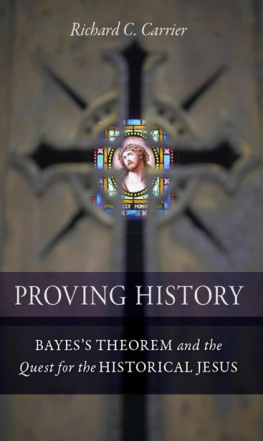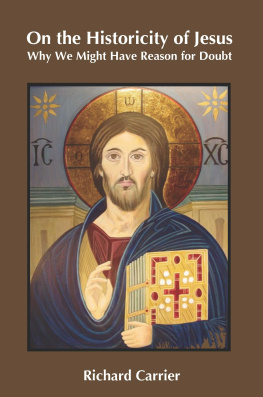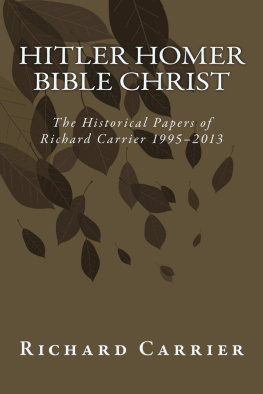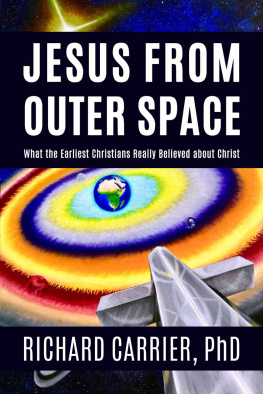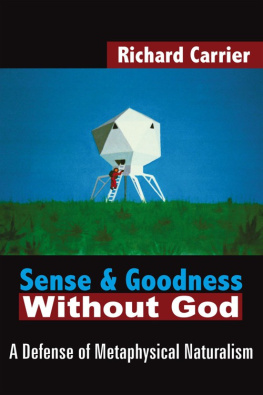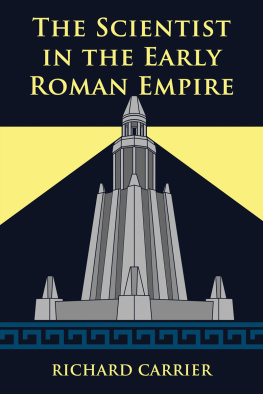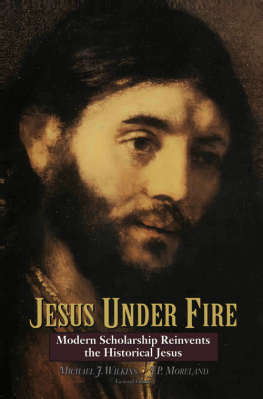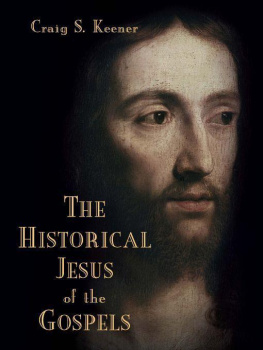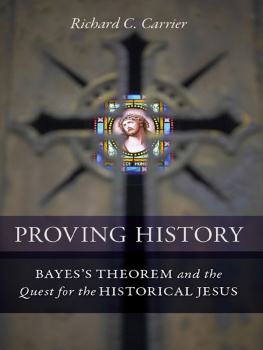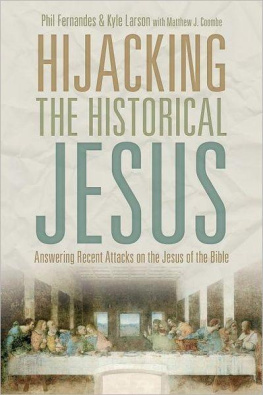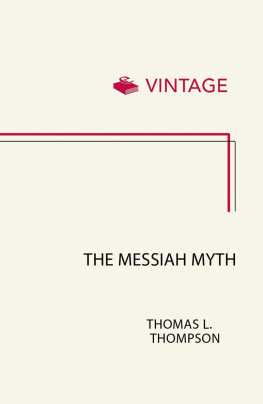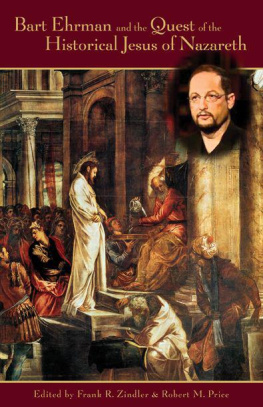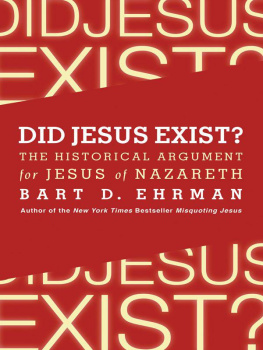
Published 2012 by Prometheus Books
Proving History: Bayes's Theorem and the Quest for the Historical Jesus . Copyright 2012 by Richard C. Carrier. All rights reserved. No part of this publication may be reproduced, stored in a retrieval system, or transmitted in any form or by any means, digital, electronic, mechanical, photocopying, recording, or otherwise, or conveyed via the Internet or a website without prior written permission of the publisher, except in the case of brief quotations embodied in critical articles and reviews.
Cover image 2012 Media Bakery
Cover design by Nicole Sommer-Lecht
Inquiries should be addressed to
Prometheus Books
59 John Glenn Drive
Amherst, New York 142282119
VOICE: 7166910133
FAX: 7166910137
WWW.PROMETHEUSBOOKS.COM
16 15 14 13 12 5 4 3 2 1
Library of Congress Cataloging-in-Publication Data
Carrier, Richard, 1969
Proving history : Bayes's theorem and the quest for the historical Jesus / by Richard Carrier.
p. cm.
Includes bibliographical references and index.
ISBN 9781616145590 (cloth : alk. paper)
ISBN 9781616145606 (ebook)
1. Jesus ChristHistoricity. 2. Bayesian statistical decision theory. I. Title.
BT303.2.C365 2012
232.9'08dc23
2011050577
Printed in the United States of America on acid-free paper


This book is the first of two volumes examining a daring question: whether there is a case to be made that Jesus never really existed as a historical person. The alternative is that Jesus originated as a mythical character in tales symbolically narrating the salvific acts of a cosmic being who never walked the earth (and probably never really existed at all). Later, according to theory, this myth was mistaken for history (or deliberately repackaged that way) and then embellished over time. The present book does not test that claim (as the next volume, On the Historicity of Jesus Christ , will), but rather begins the inquiry by resolving the central problem of method: How does one test a claim like that? Indeed, how do we test historical theories of any sort whatever? As a result, this book is of interest to all historians, even those who have no interest in the Jesus question. For here I shall explore and establish the formal logic of all historical argument.
All historians have biases, but sound methods will prevent those from too greatly affecting our essential results. No progress in historical knowledge, in fact, no historical knowledge at all, would be possible without such methods. Hence, the aim here is to develop a formal historical method for approaching this (or any other) debate, which will produce as objectively credible a conclusion as any honest historian can reach. One need merely plug all the evidence into that method to get a result. That's a bold claim, I know; but the purpose of this book is to convince you, and if in the end you are convinced, provide the background necessary to implement the method I propose. All I ask is that you give my argument a fair hearing.
You may still want to know what my biases are. I am a marginally renowned atheist, known across America (and many other corners of the world) as an avid defender of a naturalist worldview and a dedicated opponent of the abuse of history in the service of supernaturalist creeds. I am a historian by training and trade (I received my PhD in ancient history from Columbia University) and a philosopher by experience and practice (I have published peer-reviewed articles in the field and am most widely known for my book on the subject, Sense & Goodness Without God: A Defense of Metaphysical Naturalism ). I have always assumed without worry that Jesus was just a guy, another merely human founder of an entirely natural religion (whatever embellishments to his cult and story may have followed). I'd be content if I were merely reassured of that fact. For the evidence, even at its best, supports no more startling conclusion. So, I have no vested interest in proving Jesus didn't exist. It makes no difference to me if he did. I suspect he might not have, but then that's a question that requires a rigorous and thorough examination of the evidence before it can be confidently declared. Believers, by contrast, and their apologists in the scholarly community, cannot say the same. For them, if Jesus didn't exist, then their entire worldview topples. The things they believe in (and need to believe in) more than anything else in the world will then be under dire threat. It would be hard to expect them ever to overcome this bias, which makes bias a greater problem for them than for me. They need Jesus to be real; but I don't need Jesus to be a myth.
Most atheists agree. And yet so much dubious argument has appeared on both sides of this debate, including argument of such a technical and erudite character that laypeople can't decide whom to trust, that a considerable number of atheists approached me with a request to evaluate the arguments on both sides and tell them whose side has the greater merit, or whether we can even decide between them on the scanty evidence we have. That's how my involvement in this matter began, resulting in my mostly (but not solely) positive review of Earl Doherty's The Jesus Puzzle . My continued work on the question has now culminated in over forty philanthropists (some of them Christians) donating a collective total of $20,000 for Atheists United, a major American educational charity, to support my research and writing of a series of books, in the hopes of giving both laypeople and experts a serious evaluation of the evidence they can use to decide who is more probably right. The first step in that process is to assess the methods so far employed on the subject and replace them if faulty.
Though this is a work of careful scholarship, the nature of its aims and funding necessitate a style that is approachable to both experts and laypeople. By the requirements of my grant, I am writing as much for my benefactors as my fellow scholars. But there is a more fundamental reason for my frequent use of contractions, slang, verbs in the first person, and other supposed taboos: it's how I believe historians should speak and write. Historians have an obligation to reach wider audiences with a style more attractive and intelligible to ordinary people. And they can do so without sacrificing rigor or accuracy. Indeed, more so than any other science, history can be written in ordinary language without excessive reliance on specialized vocabulary (though we do need some), and without need of any stuffy protocols of language that don't serve a legitimate purpose. As long as what we write is grammatically correct, accurate and clear, and conforms to spoken English, it should satisfy all the aims of history: to educate and inform and advance the field of knowledge. This very book has been written to exemplify and hopefully prove that point.
The support I received for this work has been so generous, I must thank Atheists United for all their aid and assistance, and all those individual donors who gave so much, and for little in return but an honest report. No one (not even Atheists United, who provided me with the financial grant in aid, nor any donor to that fund) was given any power to edit or censor the content of this work or to compel any particular result. They all gave me complete academic freedom. That also means I alone am responsible for everything I write. Atheists United wanted to see what I came up with, and trusted me to do good work on the strength of my reputation and qualifications, but they do not necessarily agree with or endorse anything I say or argue. The same follows for any individual donors.
Next page
